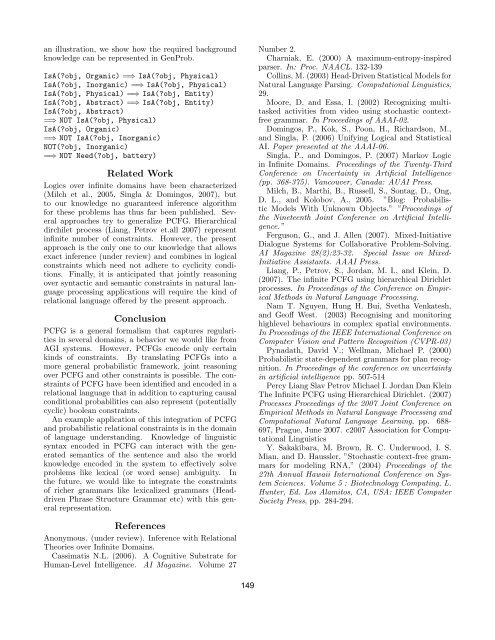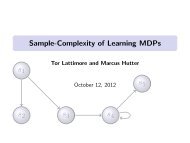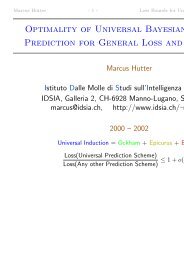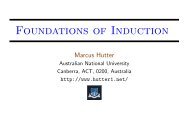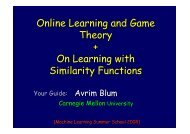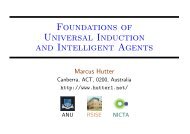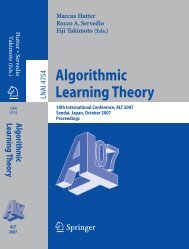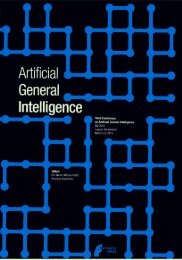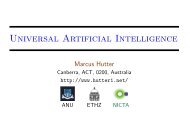A Framework for Evaluating Early-Stage Human - of Marcus Hutter
A Framework for Evaluating Early-Stage Human - of Marcus Hutter
A Framework for Evaluating Early-Stage Human - of Marcus Hutter
Create successful ePaper yourself
Turn your PDF publications into a flip-book with our unique Google optimized e-Paper software.
an illustration, we show how the required background<br />
knowledge can be represented in GenProb.<br />
IsA(?obj, Organic) =⇒ IsA(?obj, Physical)<br />
IsA(?obj, Inorganic) =⇒ IsA(?obj, Physical)<br />
IsA(?obj, Physical) =⇒ IsA(?obj, Entity)<br />
IsA(?obj, Abstract) =⇒ IsA(?obj, Entity)<br />
IsA(?obj, Abstract)<br />
=⇒ NOT IsA(?obj, Physical)<br />
IsA(?obj, Organic)<br />
=⇒ NOT IsA(?obj, Inorganic)<br />
NOT(?obj, Inorganic)<br />
=⇒ NOT Need(?obj, battery)<br />
Related Work<br />
Logics over infinite domains have been characterized<br />
(Milch et al., 2005, Singla & Domingos, 2007), but<br />
to our knowledge no guaranteed inference algorithm<br />
<strong>for</strong> these problems has thus far been published. Several<br />
approaches try to generalize PCFG. Hierarchical<br />
dirchilet process (Liang, Petrov et.all 2007) represent<br />
infinite number <strong>of</strong> constraints. However, the present<br />
approach is the only one to our knowledge that allows<br />
exact inference (under review) and combines in logical<br />
constraints which need not adhere to cyclicity conditions.<br />
Finally, it is anticipated that jointly reasoning<br />
over syntactic and semantic constraints in natural language<br />
processing applications will require the kind <strong>of</strong><br />
relational language <strong>of</strong>fered by the present approach.<br />
Conclusion<br />
PCFG is a general <strong>for</strong>malism that captures regularities<br />
in several domains, a behavior we would like from<br />
AGI systems. However, PCFGs encode only certain<br />
kinds <strong>of</strong> constraints. By translating PCFGs into a<br />
more general probabilistic framework, joint reasoning<br />
over PCFG and other constraints is possible. The constraints<br />
<strong>of</strong> PCFG have been identified and encoded in a<br />
relational language that in addition to capturing causal<br />
conditional probabilities can also represent (potentially<br />
cyclic) boolean constraints.<br />
An example application <strong>of</strong> this integration <strong>of</strong> PCFG<br />
and probabilistic relational constraints is in the domain<br />
<strong>of</strong> language understanding. Knowledge <strong>of</strong> linguistic<br />
syntax encoded in PCFG can interact with the generated<br />
semantics <strong>of</strong> the sentence and also the world<br />
knowledge encoded in the system to effectively solve<br />
problems like lexical (or word sense) ambiguity. In<br />
the future, we would like to integrate the constraints<br />
<strong>of</strong> richer grammars like lexicalized grammars (Headdriven<br />
Phrase Structure Grammar etc) with this general<br />
representation.<br />
References<br />
Anonymous. (under review). Inference with Relational<br />
Theories over Infinite Domains.<br />
Cassimatis N.L. (2006). A Cognitive Substrate <strong>for</strong><br />
<strong>Human</strong>-Level Intelligence. AI Magazine. Volume 27<br />
149<br />
Number 2.<br />
Charniak, E. (2000) A maximum-entropy-inspired<br />
parser. In: Proc. NAACL. 132-139<br />
Collins, M. (2003) Head-Driven Statistical Models <strong>for</strong><br />
Natural Language Parsing. Computational Linguistics,<br />
29.<br />
Moore, D. and Essa, I. (2002) Recognizing multitasked<br />
activities from video using stochastic contextfree<br />
grammar. In Proceedings <strong>of</strong> AAAI-02.<br />
Domingos, P., Kok, S., Poon, H., Richardson, M.,<br />
and Singla, P. (2006) Unifying Logical and Statistical<br />
AI. Paper presented at the AAAI-06.<br />
Singla, P., and Domingos, P. (2007) Markov Logic<br />
in Infinite Domains. Proceedings <strong>of</strong> the Twenty-Third<br />
Conference on Uncertainty in Artificial Intelligence<br />
(pp. 368-375). Vancouver, Canada: AUAI Press.<br />
Milch, B., Marthi, B., Russell, S., Sontag, D., Ong,<br />
D. L., and Kolobov, A., 2005. ”Blog: Probabilistic<br />
Models With Unknown Objects.” ”Proceedings <strong>of</strong><br />
the Nineteenth Joint Conference on Artificial Intelligence.”<br />
Ferguson, G., and J. Allen (2007). Mixed-Initiative<br />
Dialogue Systems <strong>for</strong> Collaborative Problem-Solving.<br />
AI Magazine 28(2):23-32. Special Issue on Mixed-<br />
Initiative Assistants. AAAI Press.<br />
Liang, P., Petrov, S., Jordan, M. I., and Klein, D.<br />
(2007). The infinite PCFG using hierarchical Dirichlet<br />
processes. In Proceedings <strong>of</strong> the Conference on Empirical<br />
Methods in Natural Language Processing.<br />
Nam T. Nguyen, Hung H. Bui, Svetha Venkatesh,<br />
and Ge<strong>of</strong>f West. (2003) Recognising and monitoring<br />
highlevel behaviours in complex spatial environments.<br />
In Proceedings <strong>of</strong> the IEEE International Conference on<br />
Computer Vision and Pattern Recognition (CVPR-03)<br />
Pynadath, David V.; Wellman, Michael P. (2000)<br />
Probabilistic state-dependent grammars <strong>for</strong> plan recognition.<br />
In Proceedings <strong>of</strong> the conference on uncertainty<br />
in artificial intelligence pp. 507-514<br />
Percy Liang Slav Petrov Michael I. Jordan Dan Klein<br />
The Infinite PCFG using Hierarchical Dirichlet. (2007)<br />
Processes Proceedings <strong>of</strong> the 2007 Joint Conference on<br />
Empirical Methods in Natural Language Processing and<br />
Computational Natural Language Learning, pp. 688-<br />
697, Prague, June 2007. c2007 Association <strong>for</strong> Computational<br />
Linguistics<br />
Y. Sakakibara, M. Brown, R. C. Underwood, I. S.<br />
Mian, and D. Haussler, ”Stochastic context-free grammars<br />
<strong>for</strong> modeling RNA,” (2004) Proceedings <strong>of</strong> the<br />
27th Annual Hawaii International Conference on System<br />
Sciences. Volume 5 : Biotechnology Computing, L.<br />
Hunter, Ed. Los Alamitos, CA, USA: IEEE Computer<br />
Society Press, pp. 284-294.


